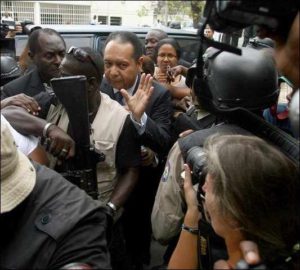 By Tracy Wilkinson, Los Angeles Times
By Tracy Wilkinson, Los Angeles Times
January 19, 2011
As an inquiry is launched into allegations that he stole millions while in power, former dictator Jean-Claude ‘Baby Doc’ Duvalier is briefly held and released. Rights groups demand he be charged with crimes against humanity, but he has many admirers in the nation he once ruled.
Reporting from Port-au-Prince, Haiti —
Inside the courthouse shaded by mango trees, the deposed dictator sipped coffee as lawyers and judges conferred.
Outside, several hundred Haitians — most too young to have a memory of Jean-Claude “Baby Doc” Duvalier’s cruel reign — chanted his name, burned tires and cried for his freedom.
In a daylong drama that frequently bordered on the absurd, Haitian authorities took Duvalier from the luxury hotel outside the capital where he has been staying since his surprise Sunday return from exile, guided him past the swimming pool and tennis courts, and bundled him off to court for questioning.Questioning about exactly what remained unclear. His entourage said he was not under arrest, and his release later in the day would seem to confirm that. But an investigative magistrate agreed to open a case against the onetime tyrant that would look into allegations that he stole millions of dollars from the hemisphere’s poorest nation.
Meanwhile, human rights organizations, and many victims of the Duvalier dynastic rule, are demanding that he be prosecuted for crimes against humanity as justice for thousands of people believed to have been killed or tortured by Baby Doc’s forces decades ago.
And still, he has a certain following in Haiti. How real, how deep, is a matter of debate. Several of his old advisors are at his side and eagerly making his case to hordes of journalists dogging his every move.
“Whatever happened 25 years ago was 25 years ago,” said Camille LeBlanc, former legal advisor to the Duvalier Cabinet. “He is a Haitian citizen with a right to be here.”
Mostly, his following is born of desperation, nostalgia for a Haiti that hardly existed. Reeling from an earthquake a year ago that killed more than 300,000 people and doomed a million to squalid tent camps, plus a raging cholera epidemic, Haiti is perhaps suffering its worst series of crises ever. That can make an old regime, even one that was brutal and dictatorial, look pretty good. Especially to those who have no options.
“We lived much better under Duvalier. We had jobs, and we could afford things,” said Marjorie Almino, 43. “Today we live like pigs, if you excuse my language.”
Almino hoisted the large red-and-black flag of Duvalier’s political party outside the courthouse. Much younger demonstrators paraded up and down the street, and black smoke from burning tires billowed overhead. A 17-year-old schoolgirl in her blue uniform drew a blank when asked what she knew about Duvalier.
“The country was better taken care of back then,” said Ronny Charles, a 27-year-old parking attendant. “There was more security. At 1 a.m. or 2 a.m. you could be out at night. That’s what my grandmother says.”
Roughly half of Haiti’s population was not born when a popular uprising sent Duvalier into exile in France in 1986. Their knowledge of those times is based on word of mouth, vague memories — like what Charles heard from his mother’s mother.
Charles didn’t go to the demonstrations Tuesday. In fact, once beyond the immediate surroundings of the courthouse, it seemed that life went on, wretchedly, with most Haitians simply scrounging for the day’s livelihood.
Charles did, however, follow the events. He was standing by a car, the radio on loudly, as breathless reporters described their stakeout and a long series of commentators went on air to give the pros and cons of Duvalier.
With Charles was Peter Sylvester, who served in the military under Duvalier. “He was a good president,” said Sylvester, 49. “Everything was cheaper then. Today everything is so expensive.”
The detention of Duvalier played out over several sun-drenched morning hours Tuesday.
About 15 well-armed Haitian police, some wearing ski masks, marched into the upscale Karibe Hotel, where Duvalier was staying, following close behind a judge and a top prosecutor. Then several of Duvalier’s lawyers appeared, fighting their way through the gathered journalists and announcing they had been summoned because Baby Doc was about to be arrested. For good measure, a white paddy wagon pulled up under the butterscotch arches of the hotel’s front drive.
Finally, Duvalier agreed to be taken away for questioning. He descended the staircase, crossed the lobby and was led through the kitchen and out the back, where a dark blue SUV awaited him. Along the way he waved at reporters, waiters and hotel staffers. The former dictator, now 59, moved unsteadily and needed assistance. His gaze appeared only semi-focused.
Under the guard of U.S. SWAT team members from the United Nations police force, the convoy carrying Duvalier left the hotel, making a hair-raising journey at a speed perhaps inappropriate for Port-au-Prince’s narrow streets, lined with vendors, schoolchildren, goats and stray dogs.
Supporters at the hotel and along the convoy route to the courthouse chanted his name, jumped up and down and demanded he be freed. In spots, they dumped dumpsters in an attempt to block the path.
The brief detention of Duvalier may have been the government’s effort to throw a bone to those outraged at his presence. It has still not been revealed how he obtained a diplomatic passport that may or may not have been expired when he traveled. And who invited him? Did President Rene Preval urge him to come as a distraction from a political crisis over elections, as some Haitians suggest? If so, why would Preval now have him detained?
“Arrest Preval!” was the shout outside the courthouse for part of the afternoon. The crowd surged, then dispersed once Duvalier departed. The deposed dictator was driven back up the hills that rise from Port-au-Prince, back to the sanctuary of the Karibe Hotel.
wilkinson@latimes.com